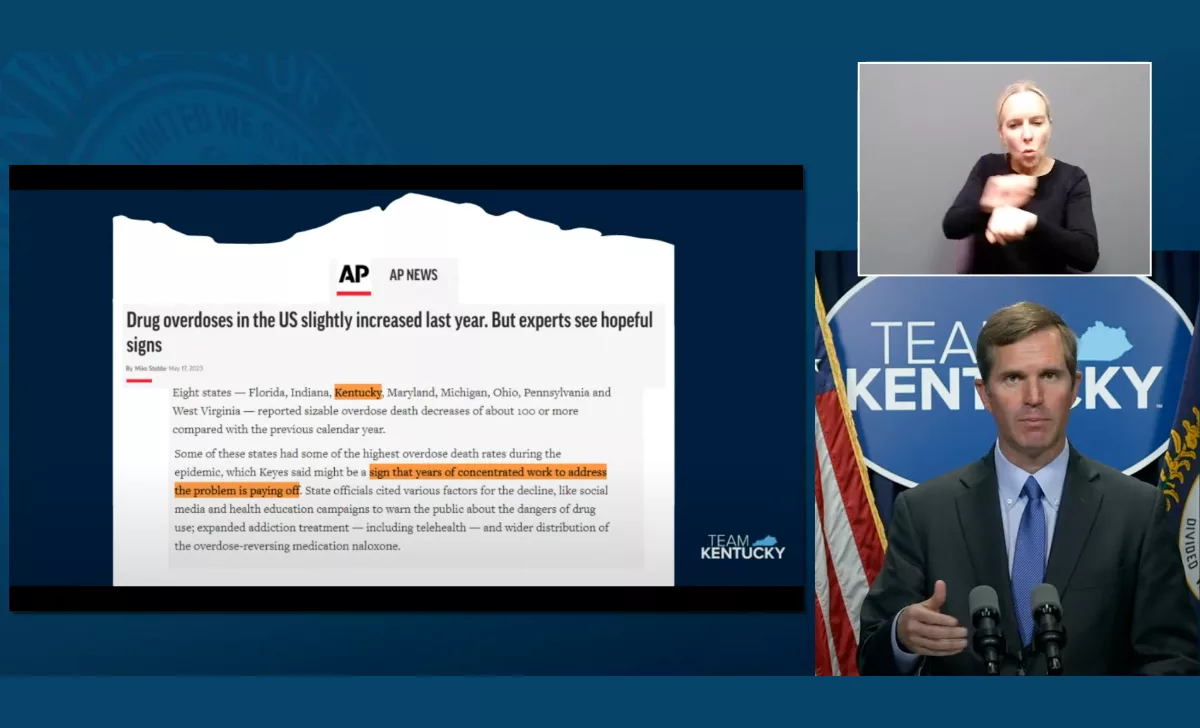Kentucky Sees Decline in Overdose Deaths Amidst National Uptick

Frankfort, Ky. – In a rare glimmer of hope amidst the ongoing opioid crisis, Kentucky has emerged as one of the few states witnessing a decline in overdose deaths. Governor Andy Beshear announced the positive development during a recent Team Kentucky Update, citing intentional efforts to address addiction and expand treatment services as key factors behind the decrease. This comes as the nation at large grapples with an overall uptick in overdose deaths.
According to a recent article published by the Associated Press, Kentucky is among eight states that experienced a substantial decrease in overdose deaths last year. While the rest of the country saw an increase in fatalities, these states managed to buck the trend by implementing various strategies to combat the drug crisis. The decline in overdose deaths is being attributed to measures such as increased access to treatment services, awareness campaigns highlighting the dangers of drug use through social media and health education, and the wider distribution of naloxone, an overdose-reversing medication.
Governor Beshear expressed his satisfaction with the progress made, stating,
Our efforts are making a difference – in fact, they are saving lives. And that is what is most important.
He acknowledged that the battle against addiction is an ongoing one and pledged to continue fighting the drug crisis with all available resources, emphasizing that even a single life lost to overdose is one too many.
Experts cautiously optimistic
While the national data on overdose deaths showed a slight increase last year, experts remain cautiously optimistic about the overall trajectory. The Centers for Disease Control and Prevention (CDC) reported that overdose deaths in the United States reached an estimated 109,680 in 2022, representing a modest 2% increase from the previous year’s figures. This contrasts with the alarming 30% surge in 2020 and a subsequent 15% rise in 2021.
Notably, the trend in overdose deaths varied significantly across states. Out of the 50 states, 23 reported a decrease in fatalities, with Iowa being the only state to witness no change. Meanwhile, the remaining states continued to experience an upward trend. Eight states, including Kentucky, reported substantial decreases in overdose deaths, with the declines amounting to approximately 100 or more compared to the previous year. This positive outcome suggests that years of concentrated efforts to combat the crisis are yielding tangible results in these regions.
Experts credit the decline in overdose deaths to several factors, such as the successful reduction of stigma surrounding addiction, increased availability of addiction treatment services through telehealth, and the widespread dissemination of information about the dangers of drug use. Dr. Joseph Kanter, the state health officer for Louisiana, one of the states that saw a decline in overdose deaths, highlighted the gradual waning of stigma as a pivotal factor in addressing the crisis.
However, experts caution against premature celebration, as the drug overdose crisis remains a complex and evolving problem. Overdose deaths in recent years have primarily been linked to fentanyl and other synthetic opioids, with a 4% increase observed in such cases in 2022. Additionally, deaths involving cocaine rose by 11%, while those involving meth and other stimulants increased by 3%. The presence of multiple drugs in overdose cases further complicates the issue, as inexpensive fentanyl is increasingly being mixed with other drugs without the knowledge of the users.
Dr. Daniel Ciccarone, a drug policy expert at the University of California, San Francisco, remains hopeful that overdose deaths will eventually decline, pointing to improvements in counseling, addiction treatment, and the availability of naloxone. However, he also expresses caution, noting that the crisis has seen temporary dips before, only to rebound to record levels. The COVID-19 pandemic further exacerbated the problem, with lockdowns and restrictions isolating individuals with substance use disorders and impeding access to treatment.
The fight against the opioid crisis remains a moving target, with new challenges emerging constantly. The detection of veterinary tranquilizer xylazine in the illicit drug supply and proposals to scale back addiction medication prescriptions through telehealth pose additional concerns. To effectively address the crisis, continuous vigilance, adaptation, and innovative solutions are essential.
As Kentucky stands out among the states making progress in curbing overdose deaths, the encouraging trend serves as a reminder of the importance of sustained efforts to combat addiction and save lives. The state’s proactive approach can serve as a model for others struggling to tackle the opioid crisis, offering hope in the face of an ongoing national struggle.
Photo: Andy Beshear presents his May 25 Team Kentucky update. (YouTube screenshot)
Recommended Posts

GOP lawmaker calls for adding ‘teeth’ to Kentucky’s new curbs on underage vaping
Tue, November 19, 2024

Prosecutors in Trump NY criminal case signal they won’t oppose delay
Tue, November 19, 2024

Trump plans to nominate billionaire buddy Howard Lutnick as Commerce secretary
Tue, November 19, 2024